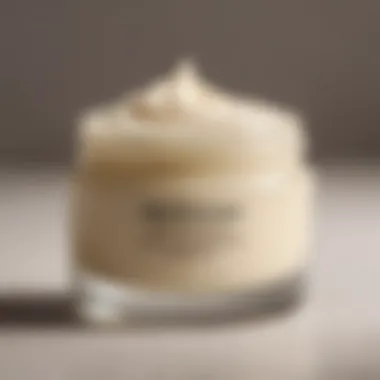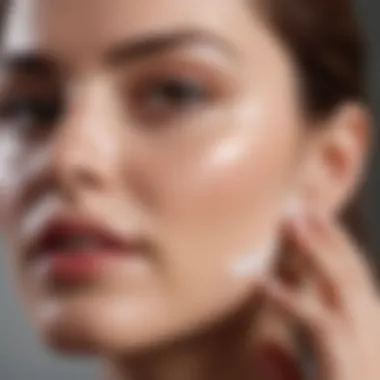Choosing the Best Day Cream for Mature Skin


Intro
Selecting the right day cream for mature skin is a significant decision in any skincare regimen. As skin ages, it undergoes various changes that can influence how products perform. Factors like loss of elasticity, increased dryness, and fine lines become prominent concerns for many. Thus, understanding these shifts is essential when identifying the optimal day cream. This guide aims to shed light on the unique needs of mature skin and provide insights on the ideal ingredients, formulations, and techniques that can enhance the effectiveness of skincare products.
A robust day cream can act as a shield, protecting the skin from environmental stressors while supplying the moisture and nutrients required to maintain a youthful appearance. As we delve deeper, we will explore the latest trends in skincare specifically for mature skin, analyze effective routines, and review popular products that best suit these requirements.
Understanding Mature Skin
Understanding mature skin is a foundational aspect of selecting effective skincare products, particularly day creams. Mature skin exhibits unique characteristics that differ significantly from younger skin. As individuals age, the skin's requirements evolve, thus necessitating specialized care to maintain health and appearance.
To effectively address the changing needs, one must consider factors such as hydration, elasticity, and overall texture. Mature skin often experiences a decline in natural oils and moisture levels, leading to dryness and a dull complexion. Educating oneself on these characteristics ensures that appropriate products are chosen, which can significantly improve skin health and appearance.
Ultimately, the objective is to identify formulations that work synergistically with the skin's natural processes. Understanding mature skin is not about adhering to a trend but rather about recognizing the essential need for targeted care as one ages.
Characteristics of Mature Skin
Mature skin is typically identified by several distinct features:
- Thinning Epidermis: Over time, the outer layer of skin becomes thinner, making it more susceptible to damage.
- Decreased Elasticity: This refers to the skin's reduced ability to bounce back after stretching. It may lead to sagging.
- Dryness: Mature skin often lacks moisture. Oil production declines, causing rough patches and increased sensitivity.
- Age Spots and Uneven Tone: Hyperpigmentation becomes more pronounced, leading to uneven skin tone and spots.
- Fine Lines and Wrinkles: With age, collagen and elastin production decreases, resulting in noticeable lines and wrinkles.
Understanding these characteristics enables tailored product selection, ensuring that the unique needs of mature skin are addressed effectively.
Common Skin Concerns in Maturity
As skin matures, several common concerns tend to arise. These may include:
- Dryness and Dehydration: A common struggle as the skin's natural moisture-retaining abilities diminish. Dry skin can lead to irritation and may exacerbate the appearance of lines.
- Loss of Firmness and Elasticity: This results in sagging skin, especially around the jawline and neck area.
- Uneven Skin Tone: Age spots and pigmentation issues often become more prevalent, impacting overall skin uniformity.
- Sensitivity: Mature skin can be more reactive, leading to redness and irritation when exposed to certain products or environmental factors.
Thus, recognizing these concerns guides individuals when choosing day creams that focus on hydration, firmness, and overall skin wellness.
The Aging Process and Skin Changes
The aging process fundamentally alters skin dynamics. As one ages, various biochemical changes occur:
- Reduction in Collagen and Elastin: These proteins are vital for maintaining skin structure. Their decline leads to noticeable sagging and wrinkles.
- Decreased Cell Turnover: Skin cells regenerate more slowly with age, contributing to a dull appearance.
- Fat Redistribution: The natural cushioning provided by fat deposits diminishes, impacting facial contours.
These changes underscore the importance of a comprehensive skincare routine. For mature skin, selecting a product that addresses specific changes can yield noticeable benefits in the long run. It is essential to understand that the aging process is natural. However, informed choices in skincare can significantly enhance skin quality and overall appearance.
The Role of Day Cream in Skincare
Day cream holds a significant role in any skincare regimen, particularly for those with mature skin. Understanding its contributions is essential for selecting a product that meets specific skin needs. The right day cream not only provides hydration but also serves as a protective layer against environmental aggressors. Furthermore, it can enhance the skin's overall appearance, offering a smoother, more youthful look. This is critical as mature skin often experiences dryness, loss of elasticity, and uneven texture.
Additionally, day creams often come equipped with various beneficial ingredients tailored for aging skin. These ingredients can help combat common concerns such as fine lines, wrinkles, and age spots. When selecting a day cream, factors like formulation type, texture, and specific skin requirements are crucial to consider.
Functionality of Day Creams
Day creams are designed primarily to moisturize the skin while providing other important benefits. They are formulated to offer hydration, making the skin feel soft and supple. This hydration is important because mature skin tends to lose moisture more rapidly than younger skin.
A well-formulated day cream will also include ingredients that protect the skin from harmful UV rays. Many creams include SPF, which is essential for preventing sun damage. Sun exposure can accelerate skin aging, leading to wrinkles and pigmentation.


Moreover, day creams can contain antioxidants that help neutralize free radicals. These harmful particles can contribute to skin aging and damage. Some common antioxidants found in day creams include vitamin C, vitamin E, and green tea extract.
Key functionalities of day creams:
- Moisturization: Keeping the skin hydrated.
- UV Protection: Shielding the skin from sun damage.
- Antioxidant Support: Reducing oxidative stress on the skin.
- Texture Improvement: Helping to smooth uneven skin texture.
Differentiating Day Creams from Night Creams
It is crucial to differentiate between day creams and night creams as each serves a distinct purpose in a skincare regime. Day creams are typically lighter, designed for daytime use. They often contain SPF and should be easily absorbed to allow for makeup application if desired.
In contrast, night creams are thicker, providing intensive nourishment during the skin's repair phase. Night creams usually lack sun protection and may include more potent active ingredients like retinol, which can increase skin sensitivity to sunlight.
Understanding these differences can dramatically improve skincare results:
- Day creams: Light texture, hydrate, protect from UV damage.
- Night creams: Richer formulation, focus on repair, more active ingredients.
Selecting the correct cream based on the time of day is crucial for achieving optimal skin health. By incorporating the appropriate products into your routine, you significantly bolster mature skin's resilience and appearance.
Key Ingredients for Mature Skin
Understanding key ingredients for mature skin is crucial in selecting the right day cream. As the skin ages, it undergoes several changes, and the choice of products must align with these shifts to maintain skin health and appearance. Certain ingredients are more effective for mature skin. It is important to identify and prioritize these for optimal results. Skincare formulations must not only address hydration but also combat signs of aging like wrinkles and sagging. Here are the essential components you need to consider:
Hydrators and Moisturizers
Mature skin often shows signs of dryness, which can accentuate the appearance of fine lines. Hydration is crucial to keep the skin plump and youthful. Ingredients like glycerin and hyaluronic acid serve as great hydrators. These substances draw moisture from the environment into the skin. Another important agent is squalane, which mimics the skin’s natural oils, providing a moisturizing effect without being heavy. When looking for creams, check for these ingredients on the label to ensure your skin receives sufficient moisture.
Antioxidants and Their Importance
Antioxidants are vital in protecting the skin from damage caused by free radicals, which can accelerate aging. Mature skin benefits significantly from ingredients like vitamin C and vitamin E. They not only guard against environmental pollutants but also help brighten the skin and improve its texture. Coenzyme Q10 is another strong antioxidant that supports cellular function. Incorporating products with these antioxidants can enhance skin resilience and appearance over time.
Peptides and Collagen Production
Peptides play a key role in supporting the skin's structure. They are chains of amino acids that signal the skin to produce more collagen. Collagen is essential for maintaining skin firmness and elasticity, which diminish with age. Look for creams containing peptides like palmitoyl pentapeptide-4 or acetyl hexapeptide-8. Regular use can lead to noticeable improvements in skin texture. Fortifying skin barriers with these products can lead to a healthier overall complexion.
SPF and Protection Against Sun Damage
Sun damage is one of the primary factors contributing to premature aging. A proper day cream must include Sunscreen Protection Factor (SPF) to prevent the harmful effects of UV rays. Ingredients such as zinc oxide and titanium dioxide provide broad-spectrum protection. Regular use of a day cream with SPF can significantly reduce the risk of skin issues like pigmentation and skin cancer. Thus, this is an absolute must in any daytime skincare routine.
"Selecting a day cream with beneficial ingredients is not just about hydration. It’s a comprehensive approach to combat the signs of aging, ensuring long-term skin health."
By choosing products with these targeted ingredients, you can better address the needs of mature skin. A well-formulated day cream not only hydrates but also fortifies and protects against environmental stressors. In the next section, we will discuss types of day cream formulations for various skin types.
Types of Day Cream Formulations
Understanding different types of day cream formulations is critical for those seeking effective skincare solutions for mature skin. Each formulation delivers unique benefits tailored to specific skin conditions. Choosing the right type can dramatically affect hydration levels, texture, and overall skin health. This section explores various formulations, allowing readers to make selections aligned with their skin's needs.
Creams for Oily vs. Dry Skin
When considering day creams, it is vital to recognize the distinctions between those designed for oily versus dry skin. Oily skin tends to produce excess sebum, which can lead to breakouts and a shiny appearance. Day creams formulated for oily skin usually contain lightweight, non-comedogenic ingredients that help control shine without clogging pores. These creams often include salicylic acid or witch hazel, which provide oil control and soothing properties.
In contrast, dry skin requires formulations focused on deep hydration and barrier repair. Creams for dry skin typically contain richer emollients, such as shea butter or hyaluronic acid. They work to lock in moisture and restore elasticity. For mature skin, this is especially important because hydration can reduce the visibility of fine lines and enhance texture.


Gel-Based vs. Traditional Creams
Another important distinction lies between gel-based creams and traditional cream formulations. Gel-based creams are characterized by their lightweight texture and quick absorption. They are usually water-based and offer a refreshing feel upon application. These formulations typically suit oily or combination skin types well.
On the other hand, traditional creams are thicker and more emollient. They often contain oils that nourish the skin. For mature skin, especially when dealing with issues like dryness or sensitivity, traditional creams can provide the necessary moisture and nutrients for improved skin texture. The choice between these formulations generally depends on personal preference and specific skin concerns.
Oil-Based Formulas
Oil-based formulas are another option worth considering, particularly for mature skin. These creams often contain essential oils or natural plant oils that provide a rich source of hydration. They create a barrier that locks in moisture, which can be especially beneficial in cooler climates or for individuals with particularly dry skin.
Such formulations also deliver added nutrients that can improve the skin's overall health. Ingredients like argan oil, jojoba oil, or rosehip oil are commonly found in these creams. These oils not only moisturize but also have antioxidant properties, supporting skin repair and functionality.
Choosing the right type of day cream formulation can enhance your skincare routine and cater effectively to your unique skin type.
Product Recommendations
Selecting the right day cream for mature skin is crucial for maintaining skin health and appearance. Mature skin often faces unique challenges that require thoughtful consideration when choosing products. The recommendations outlined here are tailored to address those specific needs, ensuring your skin receives optimal care.
When evaluating day creams, parameters such as ingredient quality, formulation suitability, and overall effectiveness should be prioritized. This selection process should consider hydrating properties, protective elements like SPF, and the presence of active ingredients which combat visible signs of aging. In this context, recommendations span across various categories—top-rated brands, budget-friendly alternatives, and luxury selections—to cater to diverse preferences and budgets.
Top Rated Day Creams for Mature Skin
Choosing a top-rated day cream often means looking at products that dermatologists and skincare enthusiasts widely endorse. Here are some notable options:
- Olay Regenerist Micro-Sculpting Cream
This cream is well-regarded for its potent combination of niacinamide and hyaluronic acid, which hydrates deeply without clogging pores. It visibly improves elasticity and minimizes fine lines. - Neutrogena Hydro Boost Gel-Cream
Renowned for its lightweight gel texture, this product offers a boost of moisture while delivering hyaluronic acid. It is especially suitable for oily and combination skin types. - Kiehl’s Super Multi-Corrective Cream
With a unique blend of peptides and hyaluronic acid, it effectively targets multiple signs of aging, making it a favorite among those seeking comprehensive skincare solutions.
Budget-Friendly Options
Budget-friendly does not mean compromising quality. Some excellent day creams are available at a reasonable price point:
- CeraVe Hydrating Cream
Packed with essential ceramides and hyaluronic acid, this cream provides moisture and helps restore the skin barrier. - The Ordinary Natural Moisturizing Factors + HA
A simple formulation that offers intense hydration. This product prioritizes the natural hydration factors that skin requires without breaking the bank.
Luxury Choices for Optimal Care
For those willing to invest more in their skincare, luxury creams often provide advanced technologies and rich textures:
- La Prairie Anti-Aging Day Cream
Known for its luxurious feel and skin-tightening properties, this cream infuses skin with moisture and enhances radiance. - Augustinus Bader The Cream
This innovative product utilizes TFC8 technology to support skin regeneration, making it a leading choice for those focusing on age-defying solutions.
"Finding the perfect day cream is not just about price, but rather about ingredient efficacy and compatibility with your skin."
Whether investing in a high-end cream or choosing a nourishing option from the drugstore, it is critical to understand personal skin requirements and to follow a regimen that promotes lasting skin health.
Application Techniques
Understanding the proper techniques for applying day cream can significantly enhance its effectiveness on mature skin. Application techniques not only contribute to the absorption of the product but also ensure that the ingredients are working optimally. Certain methods can promote circulation and improve overall skin texture. Hence, mastering these techniques is imperative for anyone seeking to optimize their skincare routine.
Proper Cleansing Before Application
Before applying any day cream, proper cleansing is crucial. Cleansing removes dirt, oil, and impurities from the skin's surface. This step is essential as it allows the cream to penetrate effectively. Using a gentle, hydrating cleanser is advisable for mature skin. This skin type tends to be drier and more sensitive, so harsh cleansers can strip natural oils, leading to further dryness.
Make sure to cleanse twice daily, once in the morning and once at night. After cleansing, pat the skin dry with a clean towel. Avoid rubbing, as this can irritate the skin. Following these steps enhances the absorption of the day cream, allowing it to nourish and protect the skin throughout the day.


Layering Products Effectively
Layering skincare products correctly is essential for maximizing their benefits. After cleansing, one should apply a moisturizer such as a day cream. However, the order of application matters. Lighter products should go first, followed by thicker ones. For instance, using a serum before the day cream can provide additional hydration and target specific skin concerns like fine lines and pigmentation.
To layer effectively:
- Start with a hydrating toner or serum.
- Apply the day cream with gentle upward strokes.
- Let each layer absorb for a few moments before applying the next.
- For added protection, consider using an SPF product as the last step.
This method not only helps in proper absorption but also ensures that the skin receives comprehensive care without feeling heavy or greasy.
Timing and Frequency of Application
Timing and frequency play a vital role in skincare routines. Day cream should be applied in the morning after cleansing. This timing ensures that the skin is shielded from external aggressors throughout the day. It is beneficial to allow the cream a few minutes to absorb fully before applying makeup or additional products.
As for frequency, daily application is essential for maintaining hydration and elasticity in mature skin. Depending on individual needs, some may benefit from reapplying during the day. Factors such as climate, skin type, and lifestyle can dictate this. In particularly dry or harsh environments, a midday touch-up might be necessary to maintain moisture levels.
Utilizing correct application techniques is key to unlocking the full potential of a day cream for mature skin.
Maintaining Mature Skin Health
To maintain mature skin health, it is vital to recognize the factors that influence skin condition. As skin ages, its structure and function change. Therefore, adapting skincare practices helps in sustaining the skin's vitality and appearance. This section examines essential aspects relevant to keeping mature skin healthy.
Lifestyle Factors Affecting Skin
Lifestyle choices significantly impact skin health. Key factors include exposure to environmental pollutants, smoking habits, and levels of physical activity.
- Environmental Pollutants: Continuous exposure to pollutants can accelerate skin aging. Pollutants can attack collagen and elastin, leading to a loss of firmness. It is essential to keep the skin clean and protected using suitable products.
- Smoking: This habit restricts blood flow to the skin. The skin becomes pale and loses its youthful glow over time. Quitting smoking can reverse some effects seen in mature skin.
- Physical Activity: Exercise increases circulation and facilitates skin healing. Regular activity contributes to healthy skin by delivering oxygen and nutrients while promoting collagen production.
The Importance of Hydration and Diet
Hydration and diet play pivotal roles in skin health. Mature skin tends to lose moisture more rapidly, which makes hydration crucial.
- Water Intake: Drinking enough water aids in maintaining skin elasticity and reducing dryness. Aim for at least eight glasses daily.
- Balanced Diet: A diet rich in fruits, vegetables, and whole grains supports skin health. Foods high in antioxidants such as blueberries, nuts, and green leafy vegetables protect skin against oxidative stress.
- Healthy Fats: Omega-3 and Omega-6 fatty acids found in fish, flaxseeds, and walnuts nourish skin and contribute to better moisture retention.
Regular Dermatological Consultations
Regular visits to a dermatologist are essential for mature skin. An expert can provide tailored advice and treatments based on individual skin needs.
- Skin Assessments: Consistent consultations facilitate monitoring of skin changes over time. Areas of concern can be addressed before they become more significant issues.
- Customized Treatment Plans: A dermatologist can recommend specific day creams and treatment regimens suitable for your skin type, ensuring the right balance of hydration and nourishment.
Remember: Engaging in proactive skincare habits is key for mature skin.
Culmination
In this comprehensive guide, we have explored the intricate factors that contribute to selecting the optimal day cream for mature skin. This topic is vital since mature skin possesses unique characteristics that demand special attention and care. Acknowledging these elements allows individuals to make informed choices in their skincare routines, optimizing the benefits of day creams tailored for their needs.
One significant element of this discussion is ingredient awareness. Specific components like hydrators, antioxidants, and SPF are essential in combating common issues associated with aging, such as dryness, dullness, and sun damage. These ingredients work synergistically to enhance skin health and appearance, offering both short-term relief and long-term benefits.
Moreover, the formulation type is another vital consideration. Different skin types, whether oily, dry, or sensitive, require specific formulations to achieve maximum efficacy. Understanding which type of cream best aligns with one's individual skin concerns can lead to improved results. Additionally, proper application techniques cannot be overlooked, as they play a crucial role in ensuring the product's effectiveness on the skin.
Regular attention to lifestyle factors such as diet, hydration, and stress management also contributes to the overall health of mature skin. Integrating these considerations with the right products enhances the overall skincare experience.
By focusing on the discussed elements, readers can better navigate the complex skincare landscape. An informed approach leads to choosing a day cream that not only addresses immediate concerns but supports skin health in the long run.
Key Takeaways
- Understanding skin characteristics is essential for selecting appropriate creams.
- Key ingredients like peptides and antioxidants play a fundamental role in restoring hydration and elasticity.
- Choosing the right formulation depends on the skin type, ensuring that the cream aligns with one's specific needs.
- Application techniques greatly influence the effectiveness of the product on the skin.
- Lifestyle factors, including nutrition and hydration, are crucial in maintaining skin vitality.
- Overall, patience and consistency in skincare routine yield the best results for mature skin.



